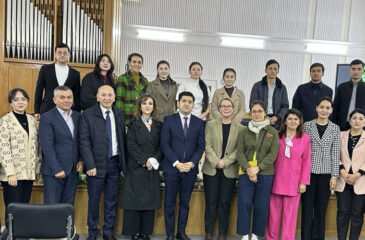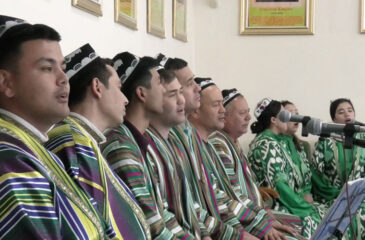Post Tagged with: "Maqām Beyond Nation"
-
Visit to the Yunus Rajabi Institute
Photo: A first-year instrumental ensemble, directed by Shahmahmut In March 2025, Rachel Harris and Mukaddas Mijit visited the Uzbek National Institute of Musical Arts Named After Yunus Rajabi in Tashkent and were treated to a tour of the Institute’s departments as well as some outstanding performances by current students and teachers. Clip: Students of Malika Khanum perform an ensemble dotar piece (excerpt) Established in 2020, the primary purpose of the […]
-
Visit to the Farg’ona Maqom School and the Marg’ilan Maqom Theatre
With members of the Marg’ilan Maqom Theatre In April 2025, Rachel Harris and Aziz Isa Elkun were generously hosted by the Maqom School led by Ulug’bek Mamadjanov, and the Maqom Theatre led by Fazil Ismailov. Both are recently established, on the foundation of existing music institutions, but with a new focus on maqom. The Maqom School holds several hundred students of school age, and several dozen talented teachers who are […]
-
“They Took the Heart of Mugham!”
“They Took the Heart of Mugham!” Azerbaijani Musicians Finding Authenticity in Iranian Traditions by Polina Dessiatnitchenko The performance is remarkable for many reasons. On the centerstage of the Mugham Center in Baku, Azerbaijan, singer Fergana Gasimova is sitting cross-legged, and as she sings, her body sways sideways, her eyes close in ecstasy, her arms thrust upward, and her head moves poignantly to the well-defined poetical meters. Instead of the usual Azerbaijani instruments, […]
-
Connecting through Nava
by Mukaddas Mijit Connecting through Nava: Documenting Shared Musical Heritage with Uzbek and Uyghur Musicians in Tashkent, March 2025 In March 2025, we embarked on a one-week field trip exploring the connections between Uzbek Maqam and Uyghur Muqam practices with few outstanding musicians. Our journey led us to the Yunus Rajabi Institute of Traditional Music in Tashkent- a landmark institution for Uzbek musical heritage. For this initial phase of our project, we […]
-
Wind of Saba: A Creative Collaboration
Ozan Baysal (bağlama) and Shohret Nur (dutar) Performance, Wind of Saba, August 13, 2024. Ozan Baysal has performed bağlama, including regional folk and Alevi traditions, since a young age. He studied institutional approaches to Turkish makam alongside jazz and classical music, and completed a PhD on bağlama şelpe (tapping) techniques at the Istanbul Technical University, MIAM. He was a visiting scholar at SOAS between 2021 and 2023. Shohret Nur was […]
-
Strand 1: Maqām across the Soviet-Chinese divide
Rachel Harris, Eugene Leung, Mukaddas Mijit. This strand aims at “unbordering” Central Asian maqām repertoires across the former Soviet-Chinese divide. It focuses on repertoires canonised in the twentieth century as the separate Uzbek and Tajik Shashmaqām, and the Uyghur Twelve Muqam, and also less recognised regional maqām traditions from Khorezm, Ferghana and Turpan. Since the mid-twentieth century these repertoires have been extensively nationalised, and the overwhelming thrust of scholarship, training […]
-
Project Strands
MAQĀM BEYOND NATION is designed in the form of six interlinked research strands based in different contact zones across the maqām world. Strand 1: Maqām across the Soviet-Chinese divide Rachel Harris, Giovanni De Zorzi, Mukaddas Mijit This strand aims at “unbordering” Central Asian maqām repertoires across the former Soviet-Chinese divide. It focuses on repertoires canonised in the twentieth century as the separate Uzbek and Tajik Shashmaqām, and the Uyghur Twelve […]
-
Maqām Beyond Nation
Maqām Beyond Nation explores a field of music-making that stretches from North Africa to Central Asia; a set of historically fluid and inter-connected creative practices which were transformed under 20th century nationalisms into fixed repertoires. The project seeks to understand the major changes which are now weakening these nationalist models. We attend to the musical materials and their potential for new creativity, and to the social: how a focus on expressive culture […]








